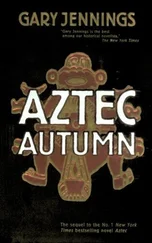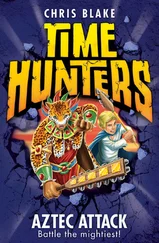Gary Jennings - Aztec
Здесь есть возможность читать онлайн «Gary Jennings - Aztec» весь текст электронной книги совершенно бесплатно (целиком полную версию без сокращений). В некоторых случаях можно слушать аудио, скачать через торрент в формате fb2 и присутствует краткое содержание. Жанр: Старинная литература, на английском языке. Описание произведения, (предисловие) а так же отзывы посетителей доступны на портале библиотеки ЛибКат.
- Название:Aztec
- Автор:
- Жанр:
- Год:неизвестен
- ISBN:нет данных
- Рейтинг книги:4 / 5. Голосов: 1
-
Избранное:Добавить в избранное
- Отзывы:
-
Ваша оценка:
- 80
- 1
- 2
- 3
- 4
- 5
Aztec: краткое содержание, описание и аннотация
Предлагаем к чтению аннотацию, описание, краткое содержание или предисловие (зависит от того, что написал сам автор книги «Aztec»). Если вы не нашли необходимую информацию о книге — напишите в комментариях, мы постараемся отыскать её.
"Anyone who reads, anyone who still lusts for adventure or that book you can't put down, will glory in Aztec."--Los Angeles Times
Aztec
Aztec
Aztec — читать онлайн бесплатно полную книгу (весь текст) целиком
Ниже представлен текст книги, разбитый по страницам. Система сохранения места последней прочитанной страницы, позволяет с удобством читать онлайн бесплатно книгу «Aztec», без необходимости каждый раз заново искать на чём Вы остановились. Поставьте закладку, и сможете в любой момент перейти на страницу, на которой закончили чтение.
Интервал:
Закладка:
That fearsome throbbing continued until we felt that our flesh must be about to shiver off our bones. Then it gradually diminished, quieter and quieter yet, until it merged into the pulsing of the smaller "god drum," which merely muttered while the chief priest chanted the standard greeting and invocation to Tlaloc. At intervals he paused for the crowd of us to respond in chorus—as your churchgoers say "Amen"—with a long-drawn owl cry of "Hoo-oo-ooo...." At other intervals he paused while his lesser priests stepped forward, reached into their robes, plucked out small water creatures—a frog, an axolotl salamander, a snake—held them up wriggling and then swallowed them whole and alive.
The chief priest concluded his opening chant with the age-old words, as loudly as he could shout them: "Tehuan tiezquiaya in ahuehuetl, in pochotl, TLALOCTZIN!"—which means, "We would that we be beneath the cypress, beneath the ceiba tree, Lord Tlaloc!"—which is to say, "We would ask your protection, your dominion over us." And at that bellow, priests in every part of the plaza threw onto the urn fires clouds of finely powdered maize flour, which exploded with a sharp crack and a dazzling flash, as if a fork of lightning had stabbed down among us. Then ba-ra-ROOM! the thunder drum smote us again, and kept on pounding until our teeth seemed to be rattling loose in our jaws.
But again it slowly quieted, and, when our ears could hear, we were listening to music played on the clay flute shaped like a sweet potato; and on "the suspended gourds" of different sizes which give different noises when struck with sticks; and on the flute made of five reeds of different lengths fastened side by side; while, behind all of those, the rhythm was kept by "the strong bone," a deer's toothed jawbone rasped with a rod. With the music came the dancers, men and women in concentric circles doing the Reed Dance. At their ankles, knees, and elbows were fastened dried pods of seeds, which rattled, whispered, and rustled as they moved. The men, wearing costumes of water blue, each carried a length of reed about as thick as his wrist and as long as his arm. The women were dressed in blouses and skirts colored the pale green of young reeds, and Tzitzitlini was their leader.
The male and female dancers glided through graceful interweavings in time to the happy music. The women waved their arms sinuously above their heads, and you could see the waving of reeds in a breeze. The men shook those thick canes they carried, and you could hear the dry rustling of reeds in a breeze. Then the music soared louder, and the women grouped in the center of the plaza, dancing in place, while the men formed a ring around them, and made a casting gesture with their thick reeds. At which, each of the things was revealed to be not just a single reed but a whole series of them, the thick one enclosing a less thick, which in turn enclosed a thinner, and so on.
When a man made that throwing movement, all the inner reeds slid out of the one held in his hand, to become a long, tapering, curving line whose tip met the tips of all the others thrown. The dancing women were embowered by a fragile dome of the reeds, and the watching crowd again went "Hoo-oo-ooo" in admiration. Then, with an adroit flick of their wrists, the men made all those reeds slide back inside each other and into their hands. The cunning trick was done again and again, in varying patterns, as when the men formed two lines and each threw his long reed to meet that of the man opposite, and the reeds made an arched tunnel through which the women danced....
When the Reed Dance was done, there came a comic interlude. Into the firelit square crept and limped all those old folk who suffer from an ailment of the bones and joints. This affliction keeps them always more or less bent and crippled, but for some reason it is especially painful to them during the rainy months. So those old men and women struggled to that ceremony to dance before Tlaloc in hope that, come the wet season, he would this time take pity and ease their aching.
They were understandably serious in their intent, but the dance was bound to be grotesque, and the spectators began to titter, then to laugh aloud, until the dancers themselves recognized their ridiculousness. One after another started to play the clown, exaggerating the absurdity of his or her limp or hobble. Eventually they were hopping on all fours like frogs, or lurching sideways like crabs, or hunching their scrawny old necks at each other like cranes in the mating season—and the watching crowd roared and rocked with laughter. The aged dancers got so carried away and so prolonged their hideous, hilarious capering that the priests had to clear them almost forcibly from the scene. It may interest Your Excellency to know that those suppliant exertions never influenced Tlaloc to benefit a single cripple—quite the contrary, many of them were permanently bedridden from that night on—but those old fools still capable would keep coming back to dance again year after year.
Next came the dance of the auyanime, those women whose bodies were reserved to the service of soldiers and knights. The dance they did was called the quequezcuicatl, "the ticklish dance," because it roused such sensations among its watchers, male and female, young and old, that they often had to be restrained from rushing in among the dancers and doing something really outrageously irreverent. The dance was so explicit in its movements that—though only the auyanime danced, and apart even from each other—you would swear they had invisible, naked male companions with whom...
Yes, well, after the auyanime had left the plaza—panting, perspiring, their hair tousled, their legs weak and wobbly—there came, to the hungry rumble of the god drum, a boy and a girl, each about four years old, in an ornate litter chair carried by priests. Because the late and unlamented Revered Speaker Tixoc had been lax in his waging of war, there had been no captive children from some other nation available for that night's sacrifice, so the priests had to buy the youngsters from two local slave families. The four parents sat well down front on the plaza and watched proudly as their babies were paraded several times past them in their several circuits of the square. The parents and the children had reason to be proud and pleased, for the little boy and girl had been purchased long enough beforehand to have been well cared for and well fed. They were now plump and perky, waving merrily to their parents and to everyone else in the crowd who waved at them. They were better dressed than they could ever have hoped to be, for they were costumed to represent the tlalóque spirits which attend upon the rain god. Their little mantles were of the finest cotton, a blue-green color patterned with silver raindrops, and they wore on their shoulder blades cloud-white wings of paper.
As had happened at every previous ceremony in honor of Tlaloc, the children were unaware of the behaviour expected of them. They were so delighted by the excitement, the colors, the lights and music that they bounced with laughter and beamed about them as radiantly as the sun. That, of course, was just the opposite of what they were meant to do. So, as usual, the priests carrying their chair had to reach up surreptitiously and pinch their bottoms. The children were at first puzzled, then pained. The boy and girl began to complain, then to weep, then to wail, as was proper. The more bawling, the more thunderstorms to come. The more tears, the more rain. The crowd joined in the crying, as was expected and encouraged, even for grown men and crusty warriors, until the hills roundabout echoed with the groaning and sobbing and beating of breasts. Every other drum and musical instrument now augmented the throbbing of the god drum and the ululation of the crowd, as the priests set down the litter chair on the far side of that stone tub of water by the pyramid. So unbelievably loud was the combined noise that probably not even the chief priest could hear the words he chanted over the two children when he lifted them and held them up one at a time to the sky, that Tlaloc might see and approve of them.
Читать дальшеИнтервал:
Закладка:
Похожие книги на «Aztec»
Представляем Вашему вниманию похожие книги на «Aztec» списком для выбора. Мы отобрали схожую по названию и смыслу литературу в надежде предоставить читателям больше вариантов отыскать новые, интересные, ещё непрочитанные произведения.
Обсуждение, отзывы о книге «Aztec» и просто собственные мнения читателей. Оставьте ваши комментарии, напишите, что Вы думаете о произведении, его смысле или главных героях. Укажите что конкретно понравилось, а что нет, и почему Вы так считаете.











